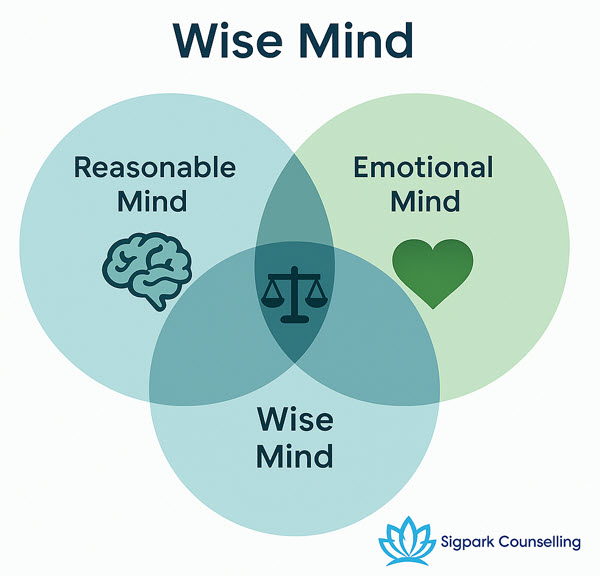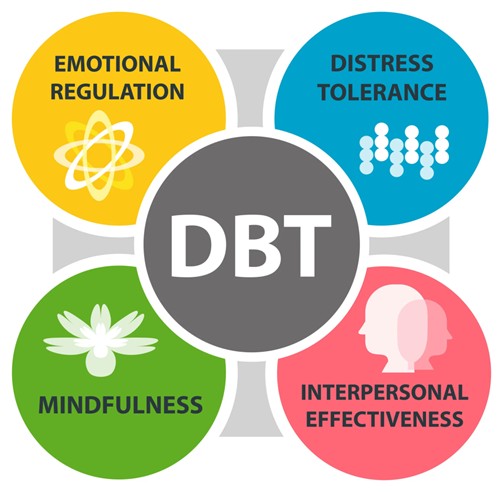Beyond Traditional Talk Therapy
Sometimes talking just isn’t enough.
If you’ve ever sat in a counselling session and thought, “This helps… but I still feel stuck,” you’re not alone. For a lot of trauma survivors, talk therapy is like putting a bandage on something much deeper. It helps, sure — but it doesn’t always reach the root.
Here’s why: trauma doesn’t just live in your thoughts. It shows up in your body, in your emotions, and in those automatic reactions that kick in before you even know what’s happening. According to the American Psychological Association, nearly 70% of adults will go through at least one traumatic event in their life… and more than 20% of those people will develop long-term symptoms that don’t just “go away” by talking about them.
That’s why modern counselling is shifting gears. Instead of relying on talk alone, many therapists are combining Dialectical Behaviour Therapy (DBT), which gives you practical skills you can actually use when emotions spike, with hypnotherapy, which helps calm and reprogram the deeper, subconscious triggers that keep pulling you back into the same patterns.
At Sigpark Counselling, this is exactly how we work. Our goal isn’t just for you to feel heard in the session. It’s for you to walk out with real tools you can use at home, at work, or when life blindsides you with a trigger.
And in this blog, I’m going to walk you through how DBT and hypnotherapy work together to create real change… the kind that lasts.
Why Trauma-Informed Care Matters
Here’s something most people don’t realize: without the right approach, therapy can actually feel unsafe.
Think about it. If you’ve been through abuse, loss, or years of constant conflict, the idea of opening up about it can feel overwhelming. You don’t want to be judged. You don’t want to feel like you’re “broken.” And you definitely don’t want to walk out of a session feeling worse than when you walked in.
That’s why trauma-informed counselling is so important. It flips the script. Instead of asking, “What’s wrong with you?” it asks, “What happened to you… and how can we support you in moving forward?”
The Substance Abuse and Mental Health Services Administration (SAMHSA) explains it this way: trauma-informed care is built around safety, trust, collaboration, empowerment, and cultural sensitivity.
Here’s what that looks like at Sigpark Counselling:
- You feel safe the moment you sit down.
- You know you’re not being judged or rushed.
- You get practical tools for handling triggers, not just conversations about them.
- You move forward at your pace, with guidance that feels supportive, never forced.
As Dr. Sandra Bloom, a leading psychiatrist and trauma researcher, says:
“A trauma-informed approach recognizes the widespread impact of trauma and integrates knowledge into every aspect of treatment. It’s about creating a safe space where survivors feel seen, heard, and empowered to move forward.”
And once that safety is in place, that’s when methods like DBT and hypnotherapy can really shine. Because healing isn’t just about what happens in the therapy room, it’s about how you start to feel in everyday life.

What is DBT (Dialectical Behaviour Therapy)?
Here’s the deal. When you’ve been through trauma, your emotions don’t always play fair. One minute you’re fine, the next you’re spiraling, maybe snapping at someone you love, or shutting down completely. It feels automatic, and that’s the problem.
That’s where DBT comes in.
Dialectical Behaviour Therapy was designed to help people who feel like their emotions run the show. Instead of just talking about what’s wrong, DBT teaches you actual skills you can use in the moment. Skills you can lean on when things get hard, not just when you’re sitting in a session.
Here are the four main areas DBT focuses on:
- Mindfulness – learning how to stay present instead of drowning in “what ifs.”
- Distress Tolerance – handling those crisis moments without making things worse.
- Emotion Regulation – understanding and calming overwhelming feelings before they take over.
- Interpersonal Effectiveness – finally being able to say what you need without guilt, conflict, or fear.

Here’s an example: imagine you’re triggered and your body is screaming “danger” even though you’re perfectly safe. DBT gives you grounding tools, like focusing on your breath or naming five things you can see, to remind your brain you’re okay. Over time, these small changes add up to big shifts in how you respond.
And the research backs it up. Studies show DBT can reduce harmful behaviors by nearly 50% and significantly improve emotional stability.
At Sigpark Counselling, DBT is part of the foundation we use to help clients feel more in control. It’s practical. It’s usable. And it’s something you can take with you long after you leave the counselling room.

What is Hypnotherapy?
Now, let’s clear something up. Hypnotherapy is not what you see on stage shows with people clucking like chickens. That’s entertainment. Clinical hypnotherapy is something completely different.
Here’s how it works: in a safe, relaxed state, your counsellor helps you tap into your subconscious mind. And that matters, because trauma doesn’t just live in your thoughts — it’s often buried in automatic reactions you can’t control. The sudden panic in a grocery store. The urge to shut down during an argument. The wave of shame that hits out of nowhere.
Hypnotherapy helps with things like:
- Calming anxiety by training your subconscious to respond differently.
- Breaking negative patterns like self-blame or unhealthy coping habits.
- Reprogramming automatic responses so you don’t get hijacked by triggers.
- Strengthening resilience by building new, healthier subconscious patterns.
Think of it this way: DBT teaches you conscious skills to deal with the moment. Hypnotherapy helps shift the automatic scripts running in the background so those moments happen less often.
And the science is there. Research shows hypnotherapy can significantly improve trauma-related symptoms like anxiety, intrusive memories, and even sleep issues.
At Sigpark Counselling, we collaborate with certified hypnotherapists so clients get the best of both worlds. The goal isn’t to erase memories. It’s to help you loosen trauma’s grip so you can finally feel safe, calm, and back in control.
Why Combine DBT + Hypnotherapy?
On their own, DBT and hypnotherapy are powerful. But together, they can transform trauma recovery in a way that few single approaches can.
Think of DBT as your toolkit for everyday life. It gives you practical, conscious skills — like how to calm yourself during a panic attack, or how to say “no” without guilt. These are strategies you can lean on in real-world situations, from stressful family dinners to overwhelming work meetings.
Hypnotherapy, on the other hand, works under the surface. It helps you access and reframe subconscious patterns that drive automatic trauma responses — the kinds of reactions that happen before you even realize it.
When combined, these approaches create a holistic path to healing:
- DBT helps you manage the present moment.
- Hypnotherapy helps you rewire the past and subconscious triggers.
- Together, they empower you to build a more stable future.
In other words, DBT helps you cope with what’s happening now, while hypnotherapy helps shift the patterns that fuel those struggles.
“Trauma is stored in both the body and the subconscious mind. Healing requires a dual approach — giving people conscious skills while also addressing the deeper, automatic responses.” — Dr. Bessel van der Kolk, author of The Body Keeps the Score
Who Benefits Most from This Approach
Not every client needs both DBT and hypnotherapy, but for those struggling with deep trauma and emotional dysregulation, the combination can be life-changing. This approach may be especially effective for:
- Survivors of abuse — whether childhood, intimate partner, or systemic trauma.
- Individuals who struggle with self-harm or suicidal thoughts.
- High-conflict families navigating cycles of anger, blame, and emotional wounds.
- Clients with PTSD, anxiety, or depression who feel stuck even after traditional therapy.
- Those who have “tried talk therapy” and still feel like their trauma runs deeper than words.
Research shows that trauma survivors often need more than one method of therapy. A study published in the Journal of Traumatic Stress found that combining multiple therapeutic modalities improved recovery outcomes compared to single-method approaches.
At Sigpark Counselling, we see this every day. Clients who once felt trapped in patterns of fear, avoidance, or self-criticism often begin to notice real change — not only in how they think, but in how they feel and respond in everyday life.

How to Access Support in Vancouver
One of the biggest barriers to trauma recovery isn’t motivation — it’s access. Many people want support but worry about affordability, scheduling, or even the logistics of getting to a session. At Sigpark Counselling, we work hard to remove those barriers so you can focus on healing.
Here’s how we make counselling more accessible:
- Low-Cost Counselling Sessions – Each week, we reserve low-cost sessions for individuals in high need of support. These provide immediate access without adding financial strain. Learn more about our fees here: https://sigparkcounselling.com/rates/.
- Two Convenient Vancouver Locations – We’re located in both Downtown Vancouver and Mount Pleasant, close to SkyTrain and with ample parking nearby. See directions here.
- Flexible Scheduling – Life doesn’t pause for trauma recovery, so neither do we. Evening, weekend, and holiday appointments are available.
- Direct Billing – We offer direct billing for many insurance providers, making payment easy and stress-free.
- Simple Payments – E-transfer and credit card options ensure you can pay in the way that works best for you.
By combining accessibility with specialized care — trauma-informed counselling, DBT, and hypnotherapy — our practice creates a safe and supportive environment where recovery feels possible.
Conclusion: Healing Beyond Talk
Trauma changes more than just your thoughts — it shapes your emotions, your relationships, and even your body. That’s why healing requires more than talk therapy. It requires tools for the conscious mind (DBT), support for the subconscious mind (hypnotherapy), and a trauma-informed environment that puts your safety first.
At Sigpark Counselling, we believe recovery isn’t just about surviving trauma — it’s about reclaiming your life. Our collaborative approach helps clients build resilience, break free from destructive patterns, and finally experience a sense of balance and hope.
“Healing takes place when people are given the tools, safety, and compassion they need to integrate their experiences and move forward.” —Sangeeta
If you’re ready to take the next step, we’re here to walk with you.
👉 Book a session today.
👉 Learn more about our services and approach.
👉 Explore rates and low-cost options.
Because healing isn’t just about talking through the past. It’s about building a stronger, healthier future — one step, and one skill, at a time.







